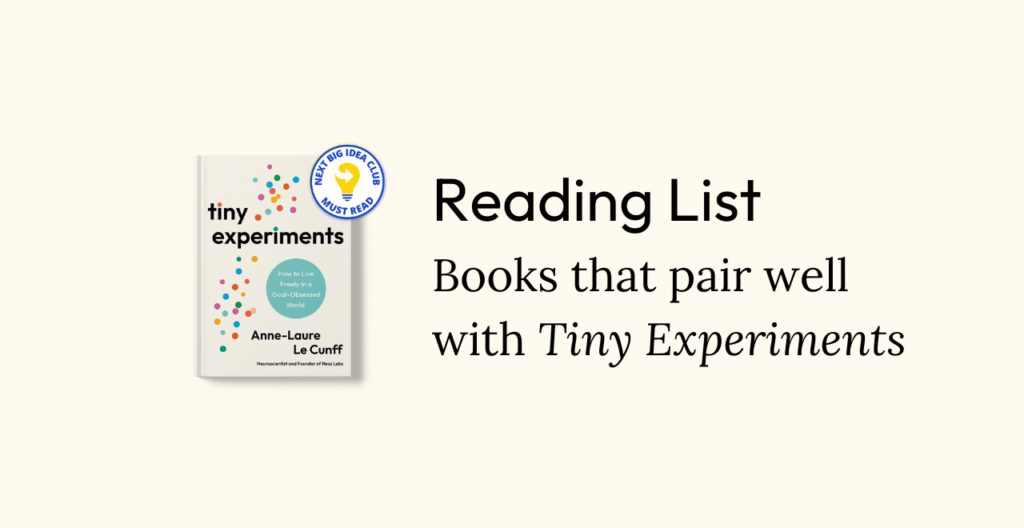
This expanded reading list was crowdsourced from the Ness Labs community and includes books that align with the themes of Tiny Experiments – exploring curiosity, unconventional career paths, and creative decision-making. Whether you’re looking for practical frameworks or philosophical insights, these books can help you continue your journey of self-discovery.
- Anything You Want by Derek Sivers – A refreshingly simple take on entrepreneurship and pursuing a meaningful life on your own terms.
- Aspiration: The Agency of Becoming by Agnes Callard – An exploration of how we shape ourselves over time through intentional growth.
- Atomic Habits by James Clear – A framework for building small, consistent habits that lead to meaningful change.
- Chaos Theory of Careers and Planned Happenstance by John D. Krumboltz and Al Levin – How to embrace uncertainty and unexpected opportunities in your career.
- Creative Dysregulation by Kelly Wilde – A deep dive into how creative minds work and the balance between structure and spontaneity.
- Crossing the Unknown Sea by David Whyte – A poetic reflection on work as a path to self-discovery and personal transformation.
- Dark Horse by Todd Rose and Ogi Ogas – Exploring unconventional career paths based on individual motivations and strength rather than standard success metrics.
- Designing Your Life by Bill Burnett and Dave Evans – A practical guide to applying design thinking principles to career and life decisions.
- Do Improvise by Robert Poynton – How improvisation can help us navigate uncertainty and act with agility.
- Finite and Infinite Games by James P. Carse – Short-term wins versus long-term, open-ended games in life.
- Flow by Mihaly Csikszentmihalyi – The psychology of optimal experience and how to cultivate deep focus and enjoyment in work and life.
- Four Thousand Weeks by Oliver Burkeman – A reflection on the finite nature of time and how to make the most of it without falling into productivity traps.
- Friend of a Friend by David Burkus – How weak ties shape opportunities and career paths.
- How to Be Everything by Emilie Wapnick – A guide for multipotentialites showing you can thrive on pursuing multiple interests.
- Life Is in the Transitions by Bruce Feiler – A roadmap for navigating life’s nonlinear changes and crossroads.
- Little Bets by Peter Sims – How breakthrough ideas emerge from small discoveries.
- Luck Is No Accident by John Krumboltz and Al Levin – How chance events can shape careers and how to make the most of them by cultivating an opportunity-driven mindset.
- Make Time by Jake Knapp and John Zeratsky – A framework for prioritizing what truly matters in daily life.
- Purposeful Curiosity by Constantine Andriopoulos – An exploration of how curiosity fuels personal and professional growth.
- Range by David Epstein – A case for developing broad skills and experiences rather than specializing too early.
- Roadmap by Roadtrip Nation – A practical resource and collection of insights on forging an unconventional career path.
- The Art of Possibility by Rosamund Stone Zander and Benjamin Zander – Practices for bringing creativity and a sense of possibility into all of your endeavors.
- The Factory by Hiroko Oyamada – A surreal exploration of the nature of work, purpose, and modern career expectations.
- The Pathless Path by Paul Millerd – A reflection on leaving conventional career tracks to find personal fulfillment.
- Thinking in Bets by Annie Duke – How to make better decisions by embracing uncertainty and understanding probabilities.
- Wanting by Luke Burgis – An exploration of mimetic desire and how social influences shape our ambitions and goals.
- Why Greatness Cannot Be Planned by Kenneth Stanley and Joel Lehman – A case for serendipity and open-ended exploration over rigid goal-setting.
- Working Identity by Herminia Ibarra – A guide to reinventing your career through small, experimental steps.
If you have suggestions for other books that align with Tiny Experiments, feel free to share them here. Happy reading!
